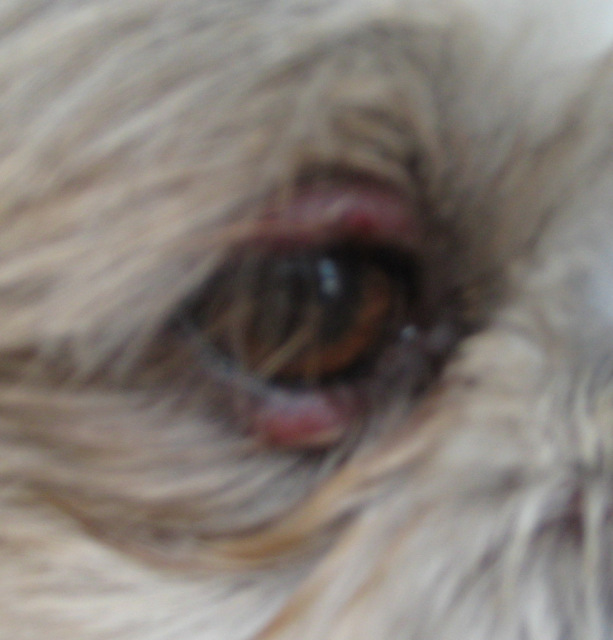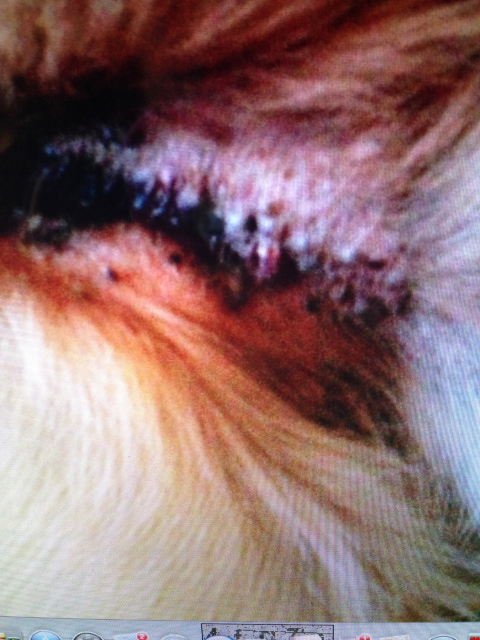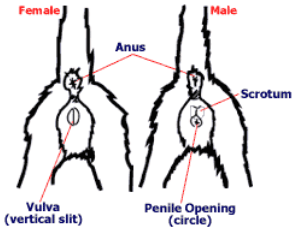QuestionI have a 3 month old, mixed breed female puppy. We got her from strangers and do not know anything about her parents or surroundings when she was born. After she had been with us about a month, we noticed she was losing her hair on top of her head. The hair eventually all fell out and she developed red, raw sores. I bought some medicine for kennel itch and applied it daily. Her head has cleared up and the hair has grown back; however, she is losing hair down her legs now and she has sores all over her body. She isn't bleeding from any of the sores, but her skin looks dry and flaky. She is eating and drinking good and hasn't lost any weight. She is active and doesn't seem to be in any major discomfort - she does scratch a little, but not excessively. None of our other dogs have been affected and they have all been in contact with her. Also, we keep her in the house and we haven't been affected either. I don't have alot of money for allergy testing and so forth - just wondering if you had any ideas or suggestions.
AnswerAmy,
After reading your concerns, two very possible different conditions popped up in my head. I will discuss both and offer some information about them, however be aware that the symptoms she is displaying can be related to a wide Varity of aliments, and conditions. The only way you will ever to be able to get an exact diagnosis is to have her seen and examined by a veterinarian. Most likely whatever the case, she will also need to be treated by a veterinarian as well. I fully understand your cost concerns and recommend that you discuss this with your veterinarian, as he will be able to discuss his plan of diagnostic and treatment with you, and there costs before hand, allowing you to perhaps have more efficient options rather than the most conventional.
I will also discuss the use of some alternative supplements that would be available over the counter and although they would not provide a complete cure, they may help in providing a source of both physical and emotional relief.
My first thought was allergies. All most all dogs come to suffer from some sort of allergen in their life. The source can be an inhalant, (pollen, mold etc.), contact, (grass, wool, etc), ingested, (food and diet related), and parasitic, (salvia of flea). Regardless, the cause, the reactions can range from an itch and a scratch, to hair loss and oozing sores. Although, I know you expressed concern about allergy testing, I will tell you that no "allergy" test is 100% complete. As most tests used today fail to include most diet related sources. Also, almost all dogs will test positive to allergens tested that they not even have in their environment. Although it may be worth the money to find an exact cause, there is no guarantees, and even if one or two were found, their may not be a treatment available or within your means.
Another thing to know is that the majority of allergens dog have are actually diet related, and easily fixed with a change of the food they are fed. Additionally, a change in diet can come to alter a dogs system so much that other allergens sources can be eliminated all together. Most pet owners are completely unaware of the ingredients being used in their pet's food, and the effect that they have on the dog's health. Most are not only completely nutritionally void, but contain items that inflict allergies, medical conditions and diseases. I will offer the list of foods that I have come to recommend after years of research I have done. I came to not only learn of these findings but also how most companies use diseased and cancerous meat scraps in their foods, not to mention that fact that they are laden with hormones, toxins, and harmful chemicals.
Because I was not only shocked and disturbed, I looked to find a food that was of the highest quality and devoid of these items. These are the foods I found: Solid Gold (Hundeneflocken), Innova, (California Natural), Neura/Old Mother Hubbard, (Wellness), and Natures Recipe (Adult, or Allergy formula,) and Natural Life, (Lambaderm).
Finally a quick note on this subject: There has been a lot of hype about the use of Natural and/or Raw diets. Upon doing the research I have since switched several of my dogs to this type diet and both my cats, with amazing results. It is has proven much more inexpensive, (although since it requires the use of many different supplements to complete nutrients needed and they are costly to purchase in the large quantities, you will need to use over a extended period of time). Also, it can be altered to fit your dog and her specific needs, even thought it may involve more time to prepare. If you wish to research more about this type of diet; look to the internet for more information or consider a great book source: Dr. Pittcarys Complete Guide to Natural Health for Dogs and Cats. The use of certain supplements added to a dog's diet; have also proven very effective in helping treat and control allergies. They include: Omega 3 fatty acids, fish oil, flaxseed oil, Vitimin E, Digestive enzymes, antioxidants, and oatmeal shampoos. These supplements can all be purchased over the counter either at pet or human grades and can vary in costs.
My other concern I thought of is Mange. Mange is caused by microscopic insects called mites. They most common form of mange is demodectic mange, which is caused by a mite that lives within the dog's hair follicle. It usually first appears as a small hairless patch near an eye or the chin. Usually it doesn't itch much and may pass unnoticed. All dogs (and people) contain these mites within our hair follicles, however in some cases certain dogs will be affected and the mite will spread to cover the entire body.
The results include hair loss, skin irritation, and thickening of the skin. These abnormally susceptible animals have a defect in their immune system so that they are not able to eliminate the mite as most dogs can. The bad news is, if this is the case there really is no indicted natural cure or fix. She would need to undergo a extensive treatment of specially medicated dips and shampoos, which are very costly. Although one source I use suggests the use of Garlic, and Echinacea, these are only suggested as supportive. I hope for her sake and yours this is not the case.
Again, the only sure way to know is to have a veterinarian perform a skin scrape and culture. I hope that I have been able to supply you with some useful information and possible solutions to her condition. Please feel free to get back to me with any additional questions or concerns.
Jodi

 Mini Pin.. not activity
Question
Mini Pin 1 1/2 year ol
I have a 1 1/2 year old
Mini Pin.. not activity
Question
Mini Pin 1 1/2 year ol
I have a 1 1/2 year old
 Shih-Tzu eyelide problem
Question
swollen eyelids
Hi,
Its been about 2 weeks no
Shih-Tzu eyelide problem
Question
swollen eyelids
Hi,
Its been about 2 weeks no
 Dermatology question
Question
Gracie Gracie 2
Hi Dr. Louis,
I
Dermatology question
Question
Gracie Gracie 2
Hi Dr. Louis,
I
 Cat Eye Infection/Cancer
Question
Eye Infection
You should know that my 9
Cat Eye Infection/Cancer
Question
Eye Infection
You should know that my 9
 kitten not using litter box, but sleeps in it
QuestionHi. We just got a new kitten. It is 9 weeks old
kitten not using litter box, but sleeps in it
QuestionHi. We just got a new kitten. It is 9 weeks old